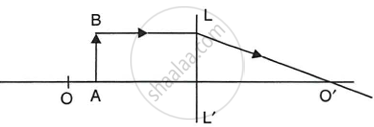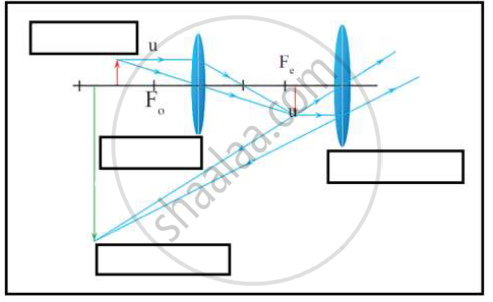Advertisements
Advertisements
Question
An object is placed at a distance equal to 2f in front of a convex lens. Draw a labelled ray diagram to show the formation of image. State two characteristics of the image formed.
Solution
Image formation diagram:

Two characteristics of the image formed:
(1)Nature of image – real and inverted.
(2)Size of Image – same size as that of object.
APPEARS IN
RELATED QUESTIONS
The diagram given alongside shows a ray of light entering a rectangular block of glass.
(a) Copy the diagram and draw the normal at the point of entry.
(b) Draw the approximate path of the ray of light through the glass block and out of the other side.
A convex lens of focal length 0.10 m is used to form a magnified image of an object of height 5 mm placed at a distance of 0.08 m from the lens. Calculate the position, nature and size of the image.
If the object is moved to a point only 3 cm away from the lens, what is the new position, height and nature of the image?
A student did an experiment with a convex lens. He put an object at different distances 25 cm, 30 cm, 40 cm, 60 cm and 120 cm from the lens. In each case he measured the distance of the image from the lens. His results were 100 cm, 24 cm, 60 cm, 30 cm and 40 cm, respectively. Unfortunately his results are written in wrong order.
Rewrite the image distances in the correct order.
Which causes more bending (or more refraction) of light rays passing through it : a convex lens of long focal length or a convex lens of short focal length?
What type of lens is used to correct
hypermetropia
Study the diagram given below.

- Name the lens LL’.
- What are the points O and O’ called?
- Complete the diagram to form the image of the object AB.
- State the three characteristics of the image.
- Name a device in which this action of lens is used.
For which position of the object does a convex lens form a virtual and erect image? Explain with the help of a ray diagram.

i. Which type of microscope has the arrangement of lenses shown in the adjoining figure?
ii. Label the figure correctly.
iii. Write the working of this microscope.
iv. Where does this microscope used?
v. Suggest a way to increase the efficiency of this microscope.
Find the odd one out and give its explanation.
